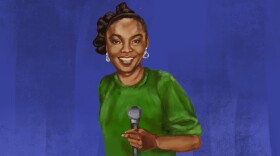
Rodney Carmichael
Rodney Carmichael is NPR Music's hip-hop staff writer. An Atlanta-bred cultural critic, he helped document the city's rise as rap's reigning capital for a decade while serving on staff as music editor, culture writer and senior writer for the defunct alt-weekly Creative Loafing.
During his tenure there, he won several Association of Alternative Newsweeklies awards for column writing, longform storytelling, special projects, investigative and feature reporting on gender and economic inequality issues ranging from strip club class-action lawsuits to harm reduction needle exchange programs. "Straight Outta Stankonia" — a cover-to-cover look at Atlanta's gentrifying cultural landscape through the lens of OutKast, which he conceived and co-wrote — was honored as one of the Atlanta Press Club's Top 10 Favorite Stories of the Past 50 Years in 2014.
A Georgia State University alum (journalism/playwriting) and former Poynter Fellow for Young Journalists, Carmichael started his career in Waco, Texas, where he received a Cox Rookie of the Year nomination for his enterprise reporting and feature writing on religion, health and social services at the Waco Tribune-Herald. Even then, race and culture lay at the heart of his coverage.
Back in Atlanta, a three-year stint at the urban lifestyle weekly rolling out deepened his commitment to cultural reporting. After covering red carpets (BET Awards, MTV VMAs), profiling Black business leaders and penning cover stories on artists ranging from Ciara to Andre 3000, his passion for storytelling led him to the alt-weekly world. During his first five years at Creative Loafing (Atlanta), he led local music coverage as music editor of the alternative weekly with the third-highest readership in the nation. During the next half-decade, Carmichael dug deeper by covering his hometown from the underground up. As it underwent cultural upheaval and shifting socioeconomics, he used Atlanta's creative economy — expanding from music, film, TV and tech — as a lens to explore the city's oft-competing identities: New South gateway, human rights hub, Black Hollywood, strip club capital and hip-hop hotbed.
Now, covering hip-hop from a national perspective at NPR, he continues to work at the intersection of race and culture. The stories he tells combine reporting and criticism to focus on black cultural production and all its sociopolitical implications. As creator and co-host of the podcast Louder Than A Riot, he and co-host Sidney Madden trace the collision and interconnected rise of hip-hop and mass incarceration in America.
-
Not everyone who was part of rap's ascent gets included in its story. MC Sha-Rock, of the original Funky 4 and the Funky 4 + 1, reaffirms her role in hip-hop's formative years as the first woman MC.
-
In hip-hop, unwritten rules have forced Black women and queer artists to fight for space. Can the genre's rule-breakers push their way to the center, while pushing the culture forward?
-
Backed by a four-piece band, the Chicago-bred MC plays a Tiny Desk home concert that simmers with soul.
-
Last month, the rapper was recommended for clemency after serving 21 years in prison for a crime he says he did not commit. Now he tells NPR about his time behind bars and his hope for life outside.
-
What role can hip-hop play in reforming — or entirely dismantling — mass incarceration? Rapper Noname and activist Mariame Kaba joined Louder Than A Riot to discuss making revolution irresistible.
-
When rapper Nipsey Hussle was killed in 2019, he was known as an advocate for the people in the neighborhood where he grew up and made his name. But the LAPD couldn't let his gang affiliation go.
-
In 2014, Bobby Shmurda aimed for a rap career and landed in prison. As the end of his sentence approaches, so do new questions about what happened, and who else paid a price.
-
When federal agents raided DJ Drama's studio in 2007 over his Gangsta Grillz empire, he became a martyr for mixtape culture. In many ways, it never recovered.
-
Mac Phipps was a rising star of New Orleans rap when he was convicted of a killing he insists he did not commit. Two decades later, he is still fighting for his freedom and his art.
-
The links between hip-hop and the prison system are on display in laws and lyrics stretching back decades. If you're caught between these two American institutions, it might look like a trap.








